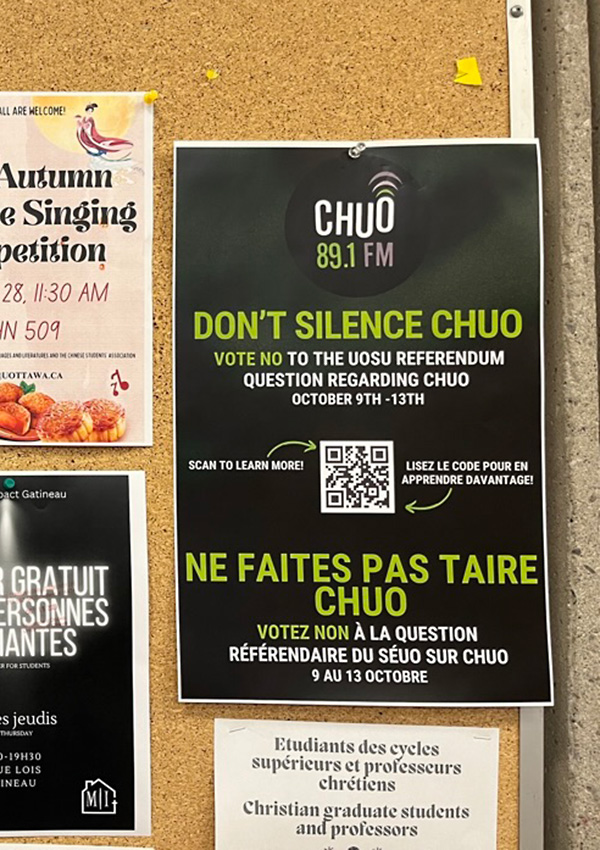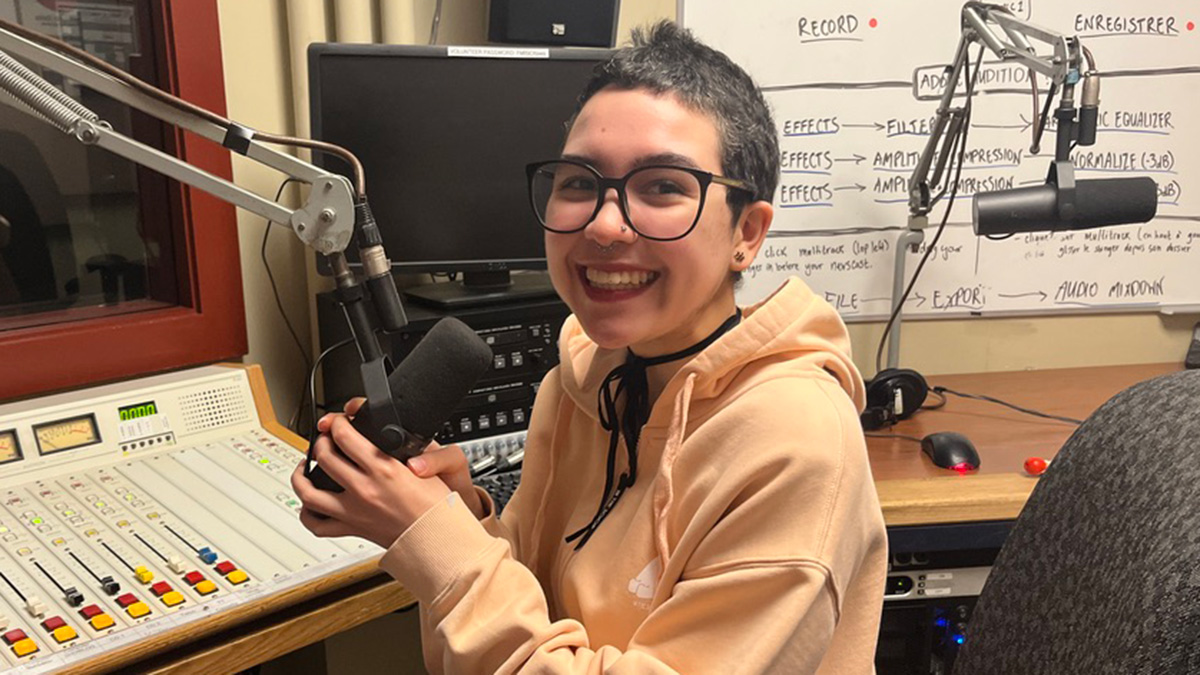The sounds of CHUO-FM are still streaming through the first level of the Jock Turcot University Centre a week after uOttawa students voted to remove funding for the campus radio station, putting its future at risk.
Acting Station Manager Grant Stein said CHUO’s volunteer board has yet to meet to discuss the results. “We’re still currently in plans to object to the referendum,” he said. “We’ve had a lot of issues with the process.”
Adrian Harewood, a journalism professor at Carleton University and a former host of CBC Ottawa News at 6, said losing CHUO would be a “huge blow” to the community and the students who use the station.
“The importance and significance of it is incalculable,” Harewood added.
“There’s a space for everyone at the campus community table. … It’s a pillar of our cultural community here in the city, and I can’t imagine the city without it.”
— Adrian Harewood, Carleton University professor
In the mid 1990s, Harewood said he contributed to CHUO’s Black On Black, a public affairs show that covers the Black community. He said it was his first “real” introduction to broadcasting.
“I treasure the latitude we had to try things and be inventive and innovative and take chances,” Harewood said. “I fell in love with the medium. … Being at CHUO and CKCU, those experiences meant everything.”
Referendum an ‘unfair’ process
Students at uOttawa voted to cut the CHUO-FM student levy in a referendum that ran from Oct. 9 to 13.
The byelection brought out 2,999 voters, 7.7 per cent of the uOttawa undergraduate student body. About 59 per cent of students voted in favour of cutting the $4.99 levy, according to the University of Ottawa student union election results.

Stein said the referendum question left the station with one day to prepare a counter campaign. He added the question was proposed by one student in an “unfair and significantly flawed process.”
Stein explained the student union election code was amended this past summer, removing safeguards that would have given them notification of the proposed change. “That, to me, has been the most significant area of contention,” he said.
Stein added that under CHUO’s signed agreement with the university’s student union, two union members sit on the station’s volunteer board. He said no one appointed has attended a meeting this year.
David Aardvark, program director at Carleton University’s radio station, CKCU-FM, said allowing a question to be proposed without enough time for discussion was “short-sighted.”
Organizations should be given an opportunity to “express the value” before being “unceremoniously defunded,” he said.
Aardvark added there should be more communication and transparency moving forward.
Two thirds of CKCU’s funding comes from a Carleton student levy, with an annual funding drive contributing to the rest. The station’s annual funding drive begins Oct. 27.
CHUO’s student levy was an estimated $335,000 of the station’s $470,000 funding last year, according to its 2022-2023 budget. The funding cut will come into effect next September.
Stein said a lot of journalists learn the “nitty gritty” through volunteering at CHUO. He said students learn how to chase stories and talk to people who are affected by today’s issues. “You can learn to make mistakes,” Stein said. “That’s really one of the strengths.”
Campus radio stations an opportunity to ‘share your voice’
Barry Rooke, executive director for the Ottawa-based National Campus and Community Radio Association, said campus radio attracts students to universities and acts as “media literacy training opportunities.”
Rooke said listenership of campus radio is increasing. More than 70 per cent of Canadians listen to community or campus radio annually, according to his association’s fall 2022 listener data update.
Rooke said campus radio, such as CanQueer, stream shows to communities that may not have the same amount of representation. CanQueer calls itself Canada’s “most syndicated LGBT talk show.”
Campus radio encourages communities to build something local, Rooke added. He said the stations are looking for independent or collective “alternative viewpoints” as a mandate, filling gaps in the media landscape.
“There are opportunities to share your voice,” Rooke said. “Whatever that voice may be.”
Adrienne Coddett, one of six current Black On Black co-hosts, said the loss of campus radio risks silencing of marginalized voices. Coddett said the show is an opportunity to have “authentic conversations about hard topics.”
Harewood shared the sentiment.
Community radio is an opportunity to “embrace ideas that sometimes society is not ready for,” he noted. He said “the sense of solidarity that exists in a space like that … It’s priceless.”
“There’s a space for everyone at the campus community table,” Harewood said. “It’s a pillar of our cultural community here in the city, and I can’t imagine the city without it.”




